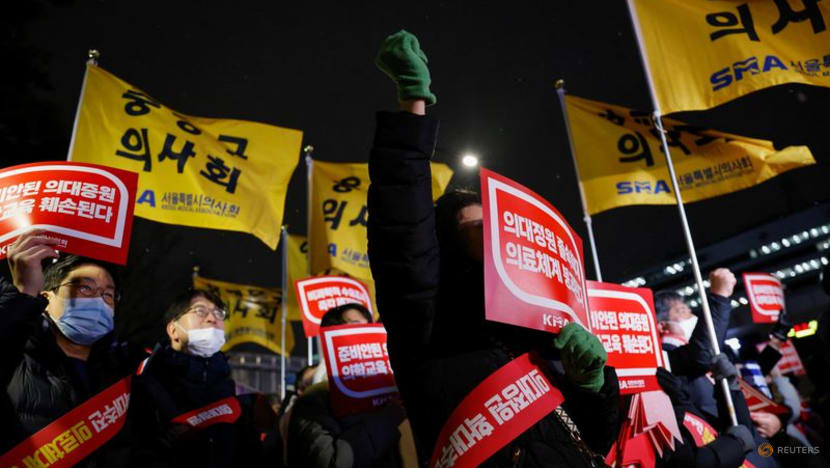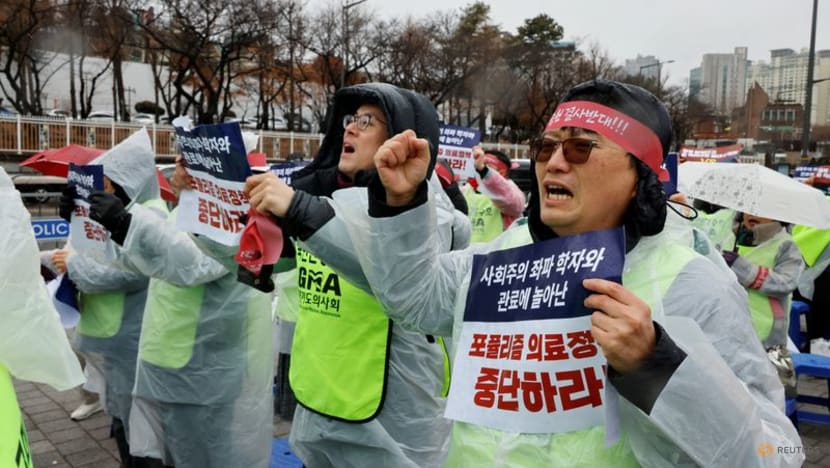.jpg)
Thousands of junior doctors in South Korea walked off the job last week, to protest against the government’s plan to raise the number of students admitted into medical schools.
The striking doctors-in-training have continued their labour action past the Thursday (Feb 29) deadline to report back to work, and now risk facing prosecution and suspension of their medical licence.
Why are junior doctors protesting?
Doctors, who are considered essential workers in South Korea, are restricted by law from striking.
But some 9,000 medical interns and residents - about 80 per cent of the trainee workforce - have been on strike since Feb 20, disrupting services at major hospitals, which have been forced to cancel surgeries and turn away some patients.
Most striking doctors remained off the job on Friday, according to South Korea's Yonhap news agency.
Their main gripe?
President Yoon Suk-yeol’s government wants to boost medical school admissions by 2,000 a year, from the current 3,058 to alleviate a shortage of doctors and a looming demographic crisis. The plan is meant to eventually add up to 10,000 doctors by 2035.
 Doctors take part in a protest against a plan to admit more students to medical school, in front of the Presidential Office in Seoul, South Korea, February 22, 2024. REUTERS/Kim Soo-Hyeon
Doctors take part in a protest against a plan to admit more students to medical school, in front of the Presidential Office in Seoul, South Korea, February 22, 2024. REUTERS/Kim Soo-HyeonSome observers believe the striking junior doctors are concerned that adding more doctors would result in a lower income.
“So junior doctors are complaining about their long working hours and low pay,” health policy and management professor Yoon Kim of Seoul National University College of Medicine told CNA’s Asia Tonight on Wednesday.
“What they are really concerned about is that increasing numbers of medical doctors would be less income for them when they finish their residency and get a job in hospitals, or open a clinic.”
Medical interns and resident doctors are also complaining that the government should focus on their working conditions, instead of making plans to sharply increase medical school admissions to cope with shortages and a fast-ageing population.
Doctors-in-training said they are underpaid, overworked and unheard.
They regularly work multiple shifts. This keeps many on the job for more than 80 hours per week, way past the country's legal limit of 52 hours a week.
In some major hospitals, junior doctors account for between 30 to 40 per cent of the total number of doctors.
Dr Soonman Kwon, professor of health economics and policy at Seoul National University, said: “In my view, as a health economist, I think that there's an overall undersupply of doctors in almost all specialty areas, except for some like cosmetic things.”
Analysts said the medical community is also ageing.
“When considering the retirement of elderly doctors, they say there is an urgent need for more doctors,” said Dr Chung Jin-Haeng, a Seoul National University College of Medicine professor who was involved in mediating dialogue between doctors and the government in the initial days of the protest.
Are trainee doctors overworked?
While South Korea takes pride in its affordable healthcare system, it has among the fewest physicians per capita in the developed world.
Data from the Organisation for Economic Cooperation and Development (OECD) shows there are approximately 2.6 doctors per 1,000 people, compared with an average of 3.7. Austria, which is the top ranked, has 5.5 doctors per 1,000 people.
“Aged people need healthcare much more than the average younger generation,” Dr Kwon told CNA’s Asia Now on Wednesday.
“So facing one of the most rapidly ageing societies, the demand for doctor services is very rapidly increasing.”
Now, the shortage of doctors has led to an overcompensation for established physicians.
 Doctors and Medical workers take part in a protest against a plan to admit more students to medical school, in front of the Presidential Office in Seoul, South Korea, February 21, 2024. REUTERS/Kim Soo-Hyeon
Doctors and Medical workers take part in a protest against a plan to admit more students to medical school, in front of the Presidential Office in Seoul, South Korea, February 21, 2024. REUTERS/Kim Soo-HyeonBeing a doctor in South Korea has long been regarded as a coveted occupation, with post-residency doctors being some of the best-paid in the developed world.
According to one survey, the country’s top 20 university majors were all in the medical field last year.
“In Korea, an average doctor earns about more than four or five times that of ordinary employees, whereas that number is usually two or three times in OECD countries,” said Dr Kwon, adding that such inflated salaries could threaten the sustainability of the healthcare system in the long run.
How is the government responding?
The government has warned of zero-tolerance for those who fail to end their walkouts.
Health Ministry officials have started visiting the homes of trainee doctors, delivering the government's back-to-work order.
Only 565 doctors out of the 9,000 striking doctors resumed work by the deadline, according to figures released by the health ministry.
Observers believe the authorities will likely limit disciplinary action to strike leaders, for fear of straining healthcare operations.
The government has filed a criminal complaint with the police on Tuesday against five doctors it suspects of encouraging a mass walkout of trainees.
Mr Yoon has maintained his hardline stance, vowing on Tuesday to go ahead with the medical reforms that had triggered the protests.
“He has a reputation to go ahead and is really determined to make it,” said Dr Kwon.

.jpg)




.jpg)
.jpg)